A smoking pipe is a device made to allow the user to inhale or taste smoke or vapor derived from the burning or vaporization of some substance. The most common form of these is the tobacco pipe, which is designed for use with tobacco, although the device itself may be used with other substances. Did you lately see a star smoke a pipe? Probably not. The postcards in today's post prove once again that times are changing...
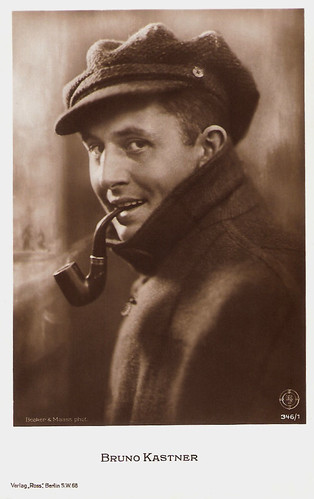
German postcard by Ross Verlag, no. 346/1, 1919-1924. Photo: Becker & Maass / RF.
German actor Bruno Kastner (1890-1932) was one of the most beloved stars of the 1910s and 1920s. His parts as the elegant and charming dandy made him a heart throb of the German silent cinema.
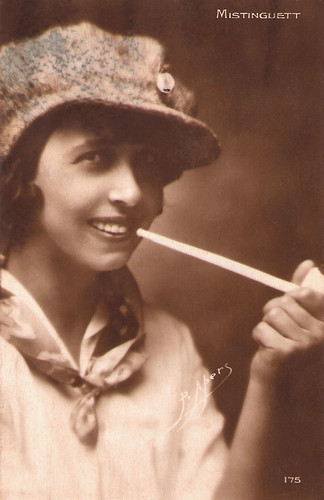
French postcard by Cinémagazine-Edition, Paris, no. 175. Photo: P. Apers.
French actress and singer Mistinguett (1875-1956) captivated Paris with her risqué routines. She went on to become the most popular French entertainer of her time and the highest paid female entertainer in the world. She appeared more than 60 times in the cinema.
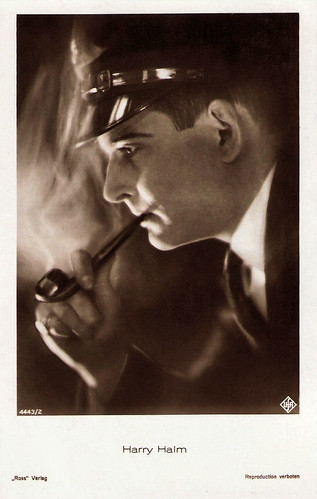
German postcard by Ross Verlag, no. 4443/2, 1929-1930. Photo: Ufa.
Charming actor Harry Halm (1901-1980) was a popular ladies’ man of the silent German cinema. Sound film and the rise of the Nazis broke his career.
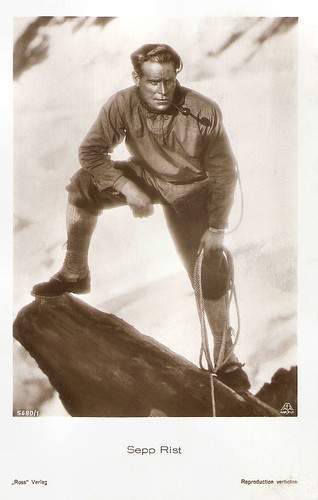
German postcard by Ross Verlag, no. 5680/1, 1930-1931. Photo: Aafa-Film. Publicity still for Stürme über dem Mont Blanc/Storm Over Mont Blanc (Arnold Fanck, 1930).
Sepp Rist (1900-1980) was a top skier, who was spotted for the Mountain films by Arnold Fanck. Later the Athletic German actor with the typical tanned and weathered face played, hunters, foresters and other rugged characters in several Heimat films.

Italian postcard by Ed. A. Traldi, Milano, no. 71. Card perhaps for Caporal Saetta (Eugenio Perego, 1924).
Domenico Maria Gambino (1891-1968) was an Italian actor, director, scriptwriter and producer. He was well-known as the acrobatic comedian Saetta and often directed his own films.
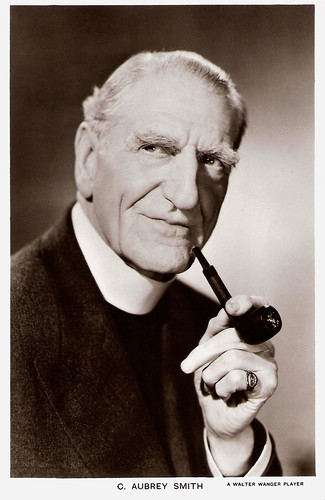
British postcard in the Picturegoer Series, London, no. 790A. Photo: Walter Wanger.
C. Aubrey Smith (1863–1948) was an English cricketer and actor, who started his film career in the British silent cinema. He went to Hollywood where he had a successful career as a character actor playing stereotypical Englishmen with the stiff upper lip and a stern determination. His bushy eyebrows, beady eyes, and handlebar moustache made him one of the most recognisable faces in Hollywood.
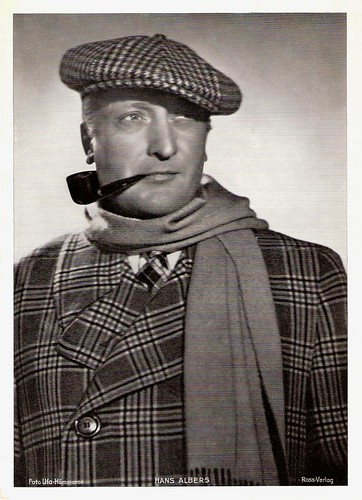
Big card by Ross Verlag. Photo: Ufa / Hämmerer.
Jovial, pleasantly plump Hans Albers (1891–1960) was a superstar of the German cinema between 1930 and 1945. He was also one of the most popular German singers of the twentieth century. His song Auf der Reeperbahn nachts um halb eins (On the Reeperbahn at half past midnight) is the unofficial anthem of Hamburg’s neighborhood of St. Pauli, famous for its brothels, music and night clubs.

German postcard by Film-Foto-Verlag, no. 3647/1, 1941-1944. Photo: Lindner / Terra.
Huge, bear-like Heinrich George (1893–1946) was a famous German stage and film actor of the Weimar republic. He starred in such classics as Metropolis (1926) and Berlin Alexanderplatz (1931). Under the Nazi regime, the former Communist was initially not permitted to work but later appeared in notorious propaganda films as Jud Süss (1940). After the war he died of starvation in a Soviet concentration camp.
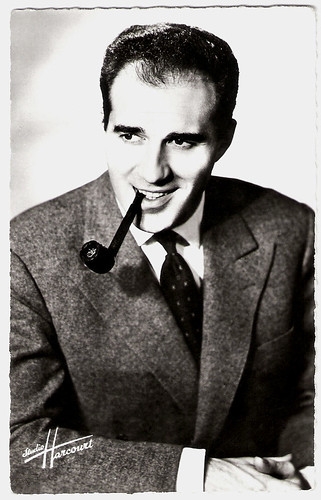
French postcard by Editions du Globe, Paris, no. 795. Photo: Studio Harcourt.
French actor Michel Piccoli (1925) has appeared in many different roles, from seducer to cop to gangster to Pope in more than 200 films and TV films. Among the directors he worked with are Jean Renoir, Jean-Pierre Melville, Jean-Luc Godard, Agnès Varda, Luis Buñuel, and Alfred Hitchcock.
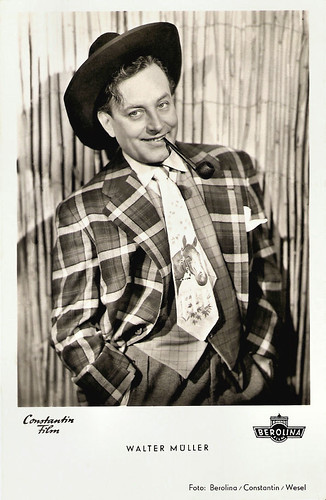
German postcard by Kunst und Bild, Berlin, no. A 1001. Photo: Berolina / Constantin / Wesel. Publicity still for Hurra - ein Junge/Hooray - a boy! (Ernst Marischka, Georg Jacoby, 1953).
Austrian actor Walter Müller (1911-1969) was a popular star of the operettas on stage and in the cinema. In the 1940s he appeared as the Sonny Boy of many German films and in the early 1950s he often played the friend or competitor of the real hero.
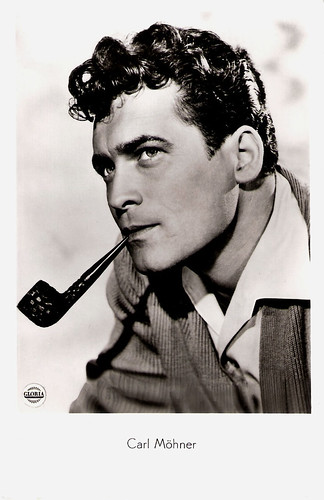
German postcard by F.J. Rüdel, Hamburg-Bergedorf. Photo: Gloria.
Handsome Austrian film actor Carl Möhner (1921–2005) appeared in over 40 films between 1949 and 1976, including the French gangster classic Du rififi chez les hommes/Rififi (1955).
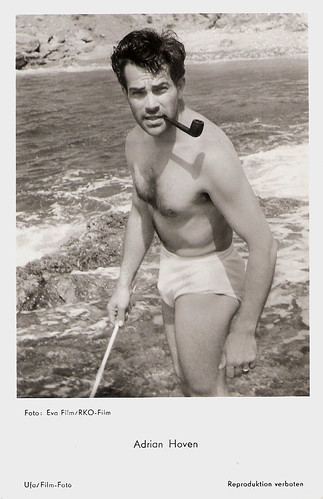
German postcard by Ufa, Berlin-Tempelhof, no. FK 1888. Photo: Eva-Film / RKO-Film. Publicity still for Solange Du Lebst/As Long as You Live (Harald Reinl, 1955).
Austrian actor Adrian Hoven (1922-1981) was the athletic and dynamic Sonnyboy of the German cinema in the 1950s, who would become one of the stars of Rainer Werner Fassbinder's films in the 1970s. As a writer, producer and director he made horror and erotica with SM overtones.
Source: Wikipedia.

German postcard by Ross Verlag, no. 346/1, 1919-1924. Photo: Becker & Maass / RF.
German actor Bruno Kastner (1890-1932) was one of the most beloved stars of the 1910s and 1920s. His parts as the elegant and charming dandy made him a heart throb of the German silent cinema.

French postcard by Cinémagazine-Edition, Paris, no. 175. Photo: P. Apers.
French actress and singer Mistinguett (1875-1956) captivated Paris with her risqué routines. She went on to become the most popular French entertainer of her time and the highest paid female entertainer in the world. She appeared more than 60 times in the cinema.

German postcard by Ross Verlag, no. 4443/2, 1929-1930. Photo: Ufa.
Charming actor Harry Halm (1901-1980) was a popular ladies’ man of the silent German cinema. Sound film and the rise of the Nazis broke his career.

German postcard by Ross Verlag, no. 5680/1, 1930-1931. Photo: Aafa-Film. Publicity still for Stürme über dem Mont Blanc/Storm Over Mont Blanc (Arnold Fanck, 1930).
Sepp Rist (1900-1980) was a top skier, who was spotted for the Mountain films by Arnold Fanck. Later the Athletic German actor with the typical tanned and weathered face played, hunters, foresters and other rugged characters in several Heimat films.

Italian postcard by Ed. A. Traldi, Milano, no. 71. Card perhaps for Caporal Saetta (Eugenio Perego, 1924).
Domenico Maria Gambino (1891-1968) was an Italian actor, director, scriptwriter and producer. He was well-known as the acrobatic comedian Saetta and often directed his own films.

British postcard in the Picturegoer Series, London, no. 790A. Photo: Walter Wanger.
C. Aubrey Smith (1863–1948) was an English cricketer and actor, who started his film career in the British silent cinema. He went to Hollywood where he had a successful career as a character actor playing stereotypical Englishmen with the stiff upper lip and a stern determination. His bushy eyebrows, beady eyes, and handlebar moustache made him one of the most recognisable faces in Hollywood.

Big card by Ross Verlag. Photo: Ufa / Hämmerer.
Jovial, pleasantly plump Hans Albers (1891–1960) was a superstar of the German cinema between 1930 and 1945. He was also one of the most popular German singers of the twentieth century. His song Auf der Reeperbahn nachts um halb eins (On the Reeperbahn at half past midnight) is the unofficial anthem of Hamburg’s neighborhood of St. Pauli, famous for its brothels, music and night clubs.

German postcard by Film-Foto-Verlag, no. 3647/1, 1941-1944. Photo: Lindner / Terra.
Huge, bear-like Heinrich George (1893–1946) was a famous German stage and film actor of the Weimar republic. He starred in such classics as Metropolis (1926) and Berlin Alexanderplatz (1931). Under the Nazi regime, the former Communist was initially not permitted to work but later appeared in notorious propaganda films as Jud Süss (1940). After the war he died of starvation in a Soviet concentration camp.

French postcard by Editions du Globe, Paris, no. 795. Photo: Studio Harcourt.
French actor Michel Piccoli (1925) has appeared in many different roles, from seducer to cop to gangster to Pope in more than 200 films and TV films. Among the directors he worked with are Jean Renoir, Jean-Pierre Melville, Jean-Luc Godard, Agnès Varda, Luis Buñuel, and Alfred Hitchcock.

German postcard by Kunst und Bild, Berlin, no. A 1001. Photo: Berolina / Constantin / Wesel. Publicity still for Hurra - ein Junge/Hooray - a boy! (Ernst Marischka, Georg Jacoby, 1953).
Austrian actor Walter Müller (1911-1969) was a popular star of the operettas on stage and in the cinema. In the 1940s he appeared as the Sonny Boy of many German films and in the early 1950s he often played the friend or competitor of the real hero.

German postcard by F.J. Rüdel, Hamburg-Bergedorf. Photo: Gloria.
Handsome Austrian film actor Carl Möhner (1921–2005) appeared in over 40 films between 1949 and 1976, including the French gangster classic Du rififi chez les hommes/Rififi (1955).

German postcard by Ufa, Berlin-Tempelhof, no. FK 1888. Photo: Eva-Film / RKO-Film. Publicity still for Solange Du Lebst/As Long as You Live (Harald Reinl, 1955).
Austrian actor Adrian Hoven (1922-1981) was the athletic and dynamic Sonnyboy of the German cinema in the 1950s, who would become one of the stars of Rainer Werner Fassbinder's films in the 1970s. As a writer, producer and director he made horror and erotica with SM overtones.
Source: Wikipedia.
No comments:
Post a Comment